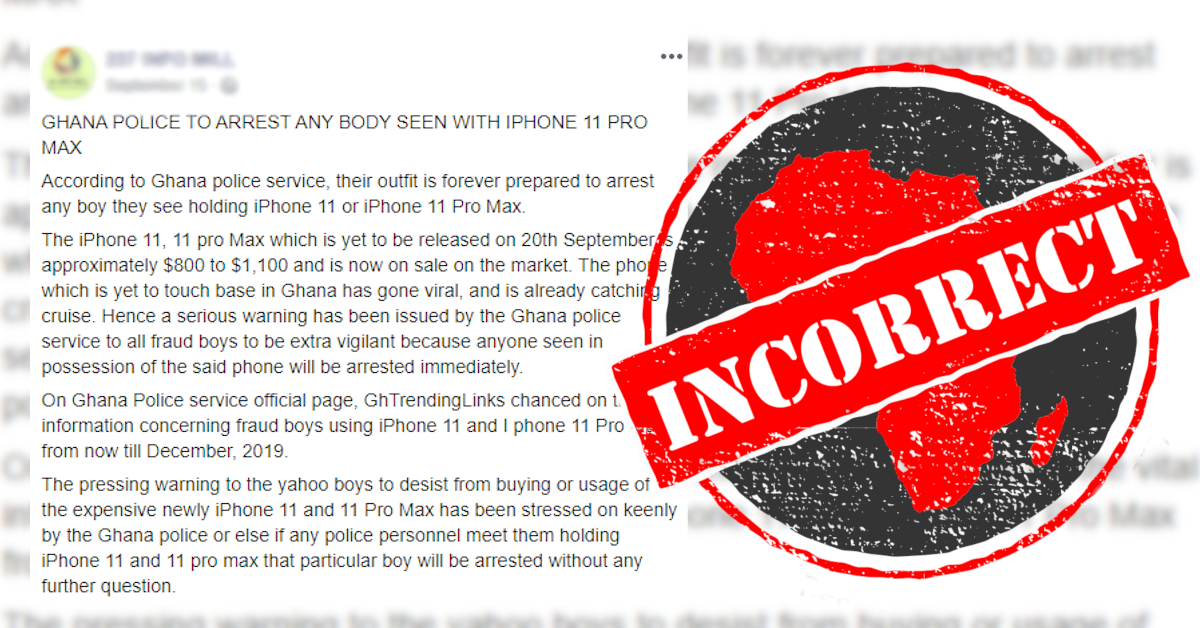Ghana’s police will arrest people seen with the latest iPhone before the end of 2019, according to blog reports and a post on Facebook.
The “Ghana police service” is “prepared to arrest any boy they see holding iPhone 11 or iPhone 11 Pro Max”, the similarly worded reports say. “The iPhone 11, 11 pro Max... is yet to touch base in Ghana.” Any “fraud boy” seen using the phones will be arrested “from now till December, 2019”.

They all include a screenshot of a Facebook post from the Ghana Police Services – GPS page.
It reads: “PUBLIC WARNING!!! From now till December if we see any young boy holding iphone 11 or 11 Pro we don't care what you tell us, you are a fraud boy simple.”
The problem is, the Facebook page is a parody account, as its handle – @ghanapoliceserviceparody – shows. It’s categorised as a “Satire/Parody” page.
And its About section reads: “this is a PARODY facebook account mimicking The Ghana Police Service JUST FOR FUN. This account DOES NOT REPRESENT THE VIEWS of the GHANA POLICE SERVICE.”
The page’s warning is just a joke.
But that hasn’t stopped the blogs and other Facebook post from taking the joke seriously, and reporting it as real news. When satire or parody is reused as serious news, it becomes misinformation.
Even the Ghana section of the Nigerian new site Naijweb published a report on the claim. The article has since been corrected to read: “Corrected: The Ghana Police Service says the account behind the message is fake.”
The official, verified Facebook page of Ghana’s police service has the handle @GhPoliceService.
Ghana’s police service has not posted anything about arresting “boys” with the new iPhones on any of its official social media accounts or its website.
The blog reports and Facebook post are incorrect. – Jennifer Ojugbeli
The “Ghana police service” is “prepared to arrest any boy they see holding iPhone 11 or iPhone 11 Pro Max”, the similarly worded reports say. “The iPhone 11, 11 pro Max... is yet to touch base in Ghana.” Any “fraud boy” seen using the phones will be arrested “from now till December, 2019”.

Parody Facebook account
They all include a screenshot of a Facebook post from the Ghana Police Services – GPS page.
It reads: “PUBLIC WARNING!!! From now till December if we see any young boy holding iphone 11 or 11 Pro we don't care what you tell us, you are a fraud boy simple.”
The problem is, the Facebook page is a parody account, as its handle – @ghanapoliceserviceparody – shows. It’s categorised as a “Satire/Parody” page.
And its About section reads: “this is a PARODY facebook account mimicking The Ghana Police Service JUST FOR FUN. This account DOES NOT REPRESENT THE VIEWS of the GHANA POLICE SERVICE.”
The page’s warning is just a joke.
When parody becomes misinformation
But that hasn’t stopped the blogs and other Facebook post from taking the joke seriously, and reporting it as real news. When satire or parody is reused as serious news, it becomes misinformation.
Even the Ghana section of the Nigerian new site Naijweb published a report on the claim. The article has since been corrected to read: “Corrected: The Ghana Police Service says the account behind the message is fake.”
The official, verified Facebook page of Ghana’s police service has the handle @GhPoliceService.
Ghana’s police service has not posted anything about arresting “boys” with the new iPhones on any of its official social media accounts or its website.
The blog reports and Facebook post are incorrect. – Jennifer Ojugbeli
Republish our content for free
For publishers: what to do if your post is rated false
A fact-checker has rated your Facebook or Instagram post as “false”, “altered”, “partly false” or “missing context”. This could have serious consequences. What do you do?
Click on our guide for the steps you should follow.
Publishers guideAfrica Check teams up with Facebook
Africa Check is a partner in Meta's third-party fact-checking programme to help stop the spread of false information on social media.
The content we rate as “false” will be downgraded on Facebook and Instagram. This means fewer people will see it.
You can also help identify false information on Facebook. This guide explains how.





Add new comment